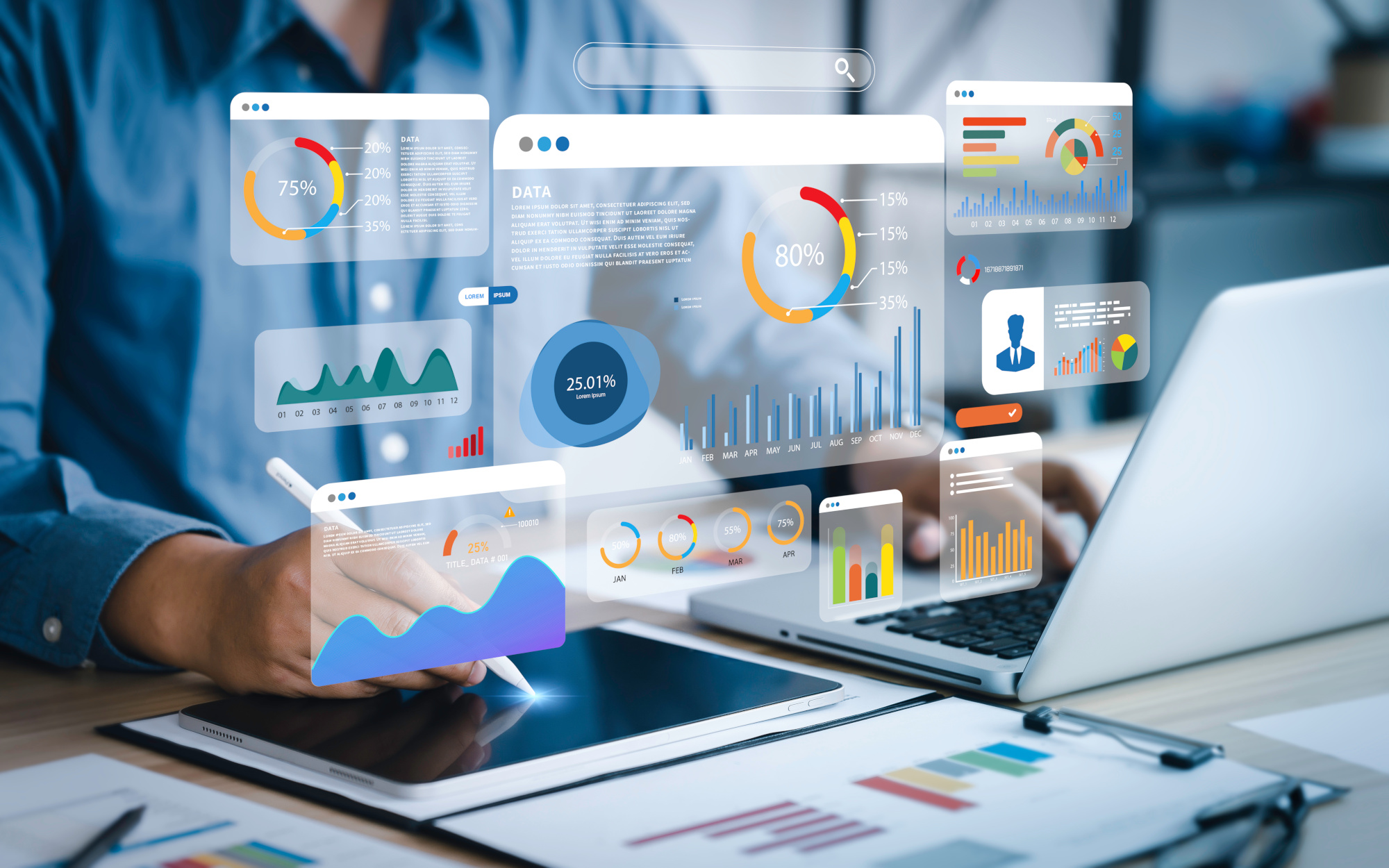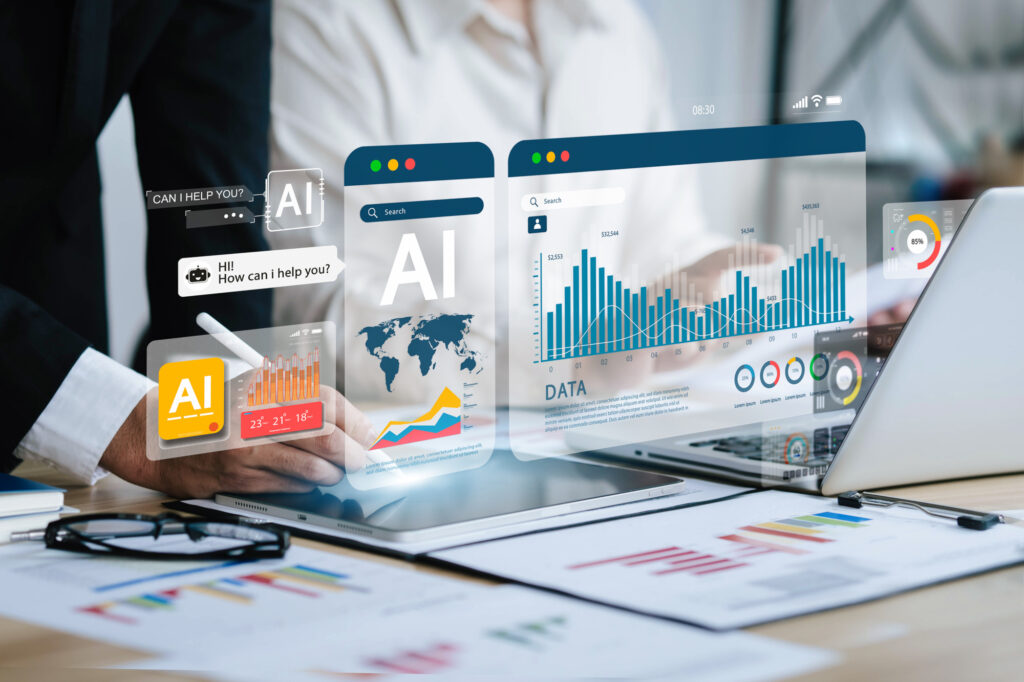Artificial Intelligence (AI) is completely transforming the business landscape, offering companies groundbreaking solutions to boost efficiency, elevate customer experiences, and fuel growth. Let’s take a look at the different ways AI is being incorporated into business operations, showcasing its potential to bring about significant changes.

What is The Role of Artificial Intelligence in Business?
AI is all about machines that are programmed to think and learn just like humans do. AI technologies in business are used to analyze data, automate processes, and provide predictive insights. It’s pretty cool how machine learning, natural language processing, and robotics are all part of this.
What Can AI Do in Business?
AI has the ability to change many parts of business operations by providing many useful tools that promote efficiency and new ideas. Here are some important places where AI for business can make a big difference:
Automate Routine Tasks
AI has the ability to take care of those repetitive and boring tasks like data entry, scheduling, and basic customer inquiries. This means that employees can spend their time on more important tasks.
Enhance Customer Service
AI-powered chatbots and virtual assistants are great tools that can offer instant, personalized customer support. They’ve been shown to help improve customer satisfaction and engagement. AI can also analyze customer feedback to understand their feelings and help make improvements to the service.
Improve Marketing Strategies
AI for small business makes tailored marketing possible by looking at how customers act and what they like, then sending them targeted ads, personalized emails, and product suggestions. With predictive analytics, marketers can see trends coming and make their efforts more effective.
Optimize Operations
AI makes supply chain management better by predicting demand, keeping track of goods, and making logistics better. Robotic Process Automation (RPA) speeds up operations and makes business processes more efficient.
Support Decision-Making
AI looks at huge amounts of data to give businesses useful insights that help them make smart decisions. This includes finding trends, predicting what might happen in the future, and making the best use of available resources.
Enhance Human Resources
AI for business speeds up hiring by screening resumes and conducting initial interviews. It also predicts how well candidates will do in the job and boosts employee retention through personalized development plans and performance reviews.
Drive Innovation
AI encourages new ideas by making it possible to create new products and services, improve old ones, and look for new market possibilities. It also works with technologies like IoT to make gadgets and systems smarter.

Ethical Considerations of AI in Business
AI has many perks, but it also brings up ethical issues that companies need to deal with.
Data Privacy
AI systems depend on huge amounts of data, which makes people worry about the safety and security of that data. Businesses need to be careful with customer data and follow the rules for data security.
Bias and Fairness
Bad or skewed results can happen because AI systems can reinforce biases found in training data. Companies need to take steps to make sure AI systems are fair and neutral.
Transparency and Accountability
Businesses need to be clear about how they use AI and hold people responsible for decisions made with AI. This includes showing people how AI systems work and letting them question choices made by computers.
Impact of AI on the Workforce
On the plus side, AI for business eliminates boring tasks, which makes things run more smoothly and frees up employees to do more important or creative work. It also makes new jobs available in areas like AI development and data science.
However, some jobs may go away, which will mean that people need to learn new skills and sharpen old ones. AI can improve current jobs by giving data-driven insights, helping people make better decisions, and helping them find a better work-life balance. Ethical concerns, like making sure it’s fair and clear, are very important to its implementation, which will have a good effect on the workforce.
The Future of AI in Business
The future of AI in business looks bright – technology keeps getting better and better, leading to even more new ideas.
Emerging Trends
- AI and IoT Integration: The integration of AI with the Internet of Things (IoT) will enable smarter devices and more efficient operations.
- AI in Cybersecurity: AI will play a crucial role in detecting and preventing cyber threats, enhancing overall security.
- AI-Driven Innovation: Businesses will continue to leverage AI for innovative solutions, such as developing new products and services and optimizing existing processes.
Preparing for the AI-Driven Future
To stay ahead of the curve, businesses need to invest in AI technologies, teach their employees new skills, and encourage a mindset of innovation. To be successful, you also need to work with AI experts and keep up with the latest trends.
How HUB Can Help
With the help of the best AI tools for business, HUB can give your business cutting-edge financial advice that is suited to its needs. Our AI financial planner uses complex algorithms to look at your financial information and give you advice on how to make your financial plans work better. Our AI-powered solutions give you reliable, data-driven advice to help you reach your business goals, whether you need help with budgeting, forecasting, or making investment decisions.
Ready to revolutionize your financial management with AI? Contact HUB today to learn how our AI financial advisor can transform your business operations and drive your success. Visit our website or request a demo using the button below. Embrace the future of finance with HUB AI!
FAQs About AI for Business
How can small businesses benefit from AI?
AI can help small businesses by automating boring chores, making customer service better with chatbots, improving marketing campaigns with personalized suggestions, and learning new things from data analysis. More and more AI tools are becoming cheap and easy to get. This makes it easier for small businesses to use these technologies to become more efficient and compete with bigger ones.
What are some examples of AI tools used in business?
A few examples of AI tools utilized by businesses are chatbots for customer care, RPA systems, marketing automation software, and predictive analytics platforms. Another example would be software that analyzes finances, optimizes supply chains, or manages client relationships (CRM).
How does AI handle data security and privacy concerns?
AI systems can make data safer by finding threats and stopping them in real time. But companies need to make sure that AI tools are built with strong security features and follow data protection rules. To keep private data safe, this means using encryption, methods for making information anonymous, and regular security checks.
Can AI help with business scalability?
Yes! AI helps businesses grow without having to spend more money on people because it automates tasks, gives them data-driven insights, and makes operations run more smoothly. Customer service, marketing, and supply chain management that are powered by AI can grow as needs do without lowering quality.
What are the challenges of implementing AI in business?
There are some problems with using AI in business, like the fact that it can be expensive at first and requires professional know-how. Businesses may also have workers who don’t want to change, so they need to make sure they get the right training and skills. It can also be hard and take a lot of time to connect AI systems to current infrastructure.
How do businesses measure the ROI of AI investments?
KPIs, like cost savings, improved efficiency, revenue growth, and customer happiness, can help businesses figure out the return on investment (ROI) of AI investments. Businesses can analyze the financial and operational effects of their AI projects by comparing these metrics before and after they were put into use.
What role does AI play in business sustainability?
The best AI for business uses resources more efficiently, cuts down on waste, and uses energy more efficiently. AI-powered analytics can help companies find ways to improve their supply chain, production processes, and general business, which can lead to more environmentally friendly and sustainable practices.
